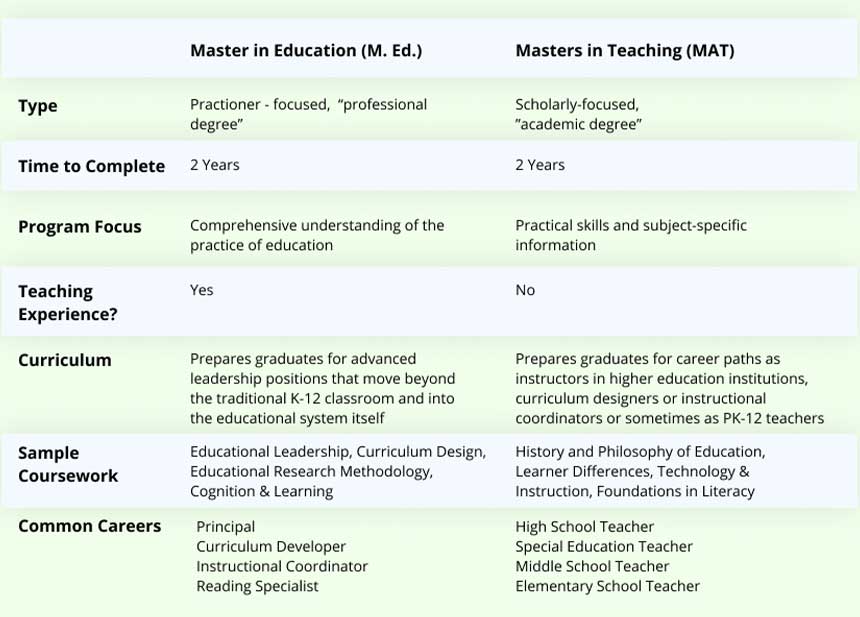You are undoubtedly “doing your homework” if you are considering a master’s degree in education to establish or develop your teaching career or to position yourself for chances outside the classroom.
This includes gaining a thorough understanding of the two basic alternatives — a Master of Education or a Master of Arts in Teaching — in order to identify which is best for you.
During your research, you will most likely come across reports stating that an M.Ed. is primarily focused on administration and other non-teaching opportunities, whereas a master degree in teaching is primarily focused on teaching. While this assessment is partially correct, it is an oversimplified explanation that does not tell the entire story.
While the Master of Education degree programs give you the freedom to hone your teaching skills, prepare for school leadership roles, and build a strong foundation from which to pursue other interests in education, a Master of Arts in Teaching is typically designed for those who are already teachers or plan to teach in the classroom.
One of the most striking parallels between the two degrees is that they’re both a tried-and-true approach to pursue your passion for learning while simultaneously broadening your professional options and earning potential.
Keep on reading for an in-depth Masters in Education vs Masters in Teaching comparison.

What is Master in Education Degree?
A Master of Education degree is intended for current teachers who want to learn more about teaching theories, pedagogy, techniques, and other topics. Though the degree is well-suited to instructors looking for new ways to make a bigger difference in the lives of their students, those who pursue the M.Ed. path frequently want to advance their careers beyond the classroom.
An M.Ed. will prepare you for success if you want to be a school principal, develop curriculum in a college or university setting, or position yourself for business jobs such as corporate trainer.
Furthermore, most M.Ed. programs allow students to specialize in a specific field, such as:
- Instruction & Curriculum
- Leadership in Schools, Inclusive Learning, and Special Education
- Digital Learning & Literacy
- STEAM POWER (Science, Technology, Engineering, Arts and Mathematics)
- Innovation and Technology
M.Ed. programs typically take two years to complete, but more institutions are now offering flexible online formats that allow you to work full-time as a teacher while pursuing your Master’s degree. The majority of master’s degrees in education will prepare you for initial licensure in your state.
What is a Master Degree in Teaching?
A Master of Arts in Teaching degree is designed to give current and prospective teachers the hands-on, practical skills they need to be effective in the classroom.
If you are currently teaching and want to improve your subject-specific skills and strategies, a MAT can help you do so:
- Childhood Education
- Elementary Education
- Secondary Education
- Special Education
- Gifted & Talented Education
Similarly, if you want to change careers and become a teacher, the MAT will provide you with the necessary education and prepare you for initial licensure in your state. Another reason the MAT degree is an excellent choice for career changers is that there is usually a required student teaching component, which allows you to practice and gain experience in a real classroom.
MAT degree programs, like M.Ed. programs typically take about two years to complete and are available in a variety of formats at many schools across the country.
Difference Between Masters in Teaching And Masters in Education
When it comes to the Masters in education vs masters in teaching matter, both programs have benefits and drawbacks. Master of Arts in Teaching programs are packed with useful, discipline-specific information.
This narrowed focus is advantageous for students who want to improve their subject knowledge, but it may be disadvantageous for those who want to advance their education beyond classroom teaching.
Individuals with bachelor’s degrees in another field who want to change careers should consider taking a MAT.
MEd degrees, on the other hand, frequently require more theoretical coursework and provide a more comprehensive understanding of the teaching profession as a whole, including an in-depth understanding of the pedagogy or instructional strategies relevant to the area of concentration.
The Master of Education is the best degree for students who want to be instructional or school leaders. Furthermore, an MEd may be the first stage in educational doctoral programs, allowing interested students to pursue additional advanced study at a later date.
To help you better understand the whole picture, we provided the following table:

Career Opportunities And Salaries M.Ed. vs. MAT
Let’s face it, teachers choose to teach because they enjoy it, not because they want to get rich. A master’s degree, on the other hand, not only broadens your career options but can also significantly increase your earning potential.
Though estimates vary widely, a report by the U.S. Bureau of Labor Statistics examining graduate degree “wage premiums” for those with a master’s degree over those with a bachelor’s degree reveals significant differences in the education field.
Education administrators received the greatest percentage wage premium, with master’s degree holders earning 44% more than bachelor’s degree holders.
Preschool and kindergarten teachers received a wage premium that was nearly as high, at 43 percent.” The difference between elementary and secondary school teachers ranged between 24 and 28 percent.
The following are the national median masters in education salary data for jobs commonly held by education professionals with a Master of Education or a Master of Arts in Teaching:
Salary and jobs after master of education:
- Training and Development Manager – $108,250
- School Principal – $94,390
- Post-Secondary Education Administrator – $92,360
- Instructional Coordinator – $64,450
- Curriculum Developer – $62,270
- Special Education Teacher — $59,780
- School Counselor – $55,410
- Media Specialist – $46,849
Masters in teaching jobs titles and salaries:
- High School Teacher – $60,320
- Special Education Teacher — $59,780
- Middle School Teacher – $58,600
- Elementary School Teacher – $58,230
- Adult Literacy and HS Equivalency Diploma Teacher – $53,630
Will a MAT or MEd Help You Earn More in Teaching or Administration?
You will almost certainly earn more after completing a master’s degree program. It is not uncommon for school districts to pay teachers and administrators with advanced degrees more than those with less experience. Approximately 88 % of school districts pay teachers based on their educational level.
When it comes to masters in teaching salary, MAT or MEd graduates can earn up to $10,000 more per year than their non-advanced degree colleagues. That means you’ll earn around $2 million in your lifetime, compared to 1.7 million for those with only a bachelor’s degree.
To wrap it all up, we’ll provide answers to some of the most frequently asked questions:
FAQ
- Is a masters in education the same as a teaching credential? No, a teaching certificate is not equivalent to a master’s degree. A master’s degree certifies that you have mastered the knowledge within a university’s program area, whereas a teaching credential is the process of becoming licensed to teach in a specific state.
- What masters degree is best for teaching? If you want to be a teacher and already have a Bachelor’s degree in a related field, a Masters in Teaching is the degree program for you. It will provide you with the necessary skills and qualifications to face any professional challenges.
- Does it matter where you get your masters in education? When it comes to selecting the best online master’s degree in education, experts say the program’s reputation is more important than the mode of instruction, regardless of specialty.
- Are teachers with master’s degrees better teachers? According to Arroyo Research Services’ study “Master’s Degrees and Teacher Effectiveness: New Evidence From State Assessments,” teachers who earn master’s degrees are more effective teachers than those who do not.
Final Word
You will be able to determine which program is best for you once you understand the distinctions between the Master’s in Education and the Master’s in Teaching. Each program provides specific benefits and prepares you for a specific field of study, so make sure you thoroughly research all of your options before making your final decision.
Do you want to improve your teaching skills and learn how to engage your students more effectively? Our Masters of Education in Educational Leadership programme is a one-of-a-kind curriculum that allows teachers, trainers, and tutors from all backgrounds to reflect on their teaching practices and enhance them in new ways.
Start your journey today by downloading our prospectus or contacting us.


